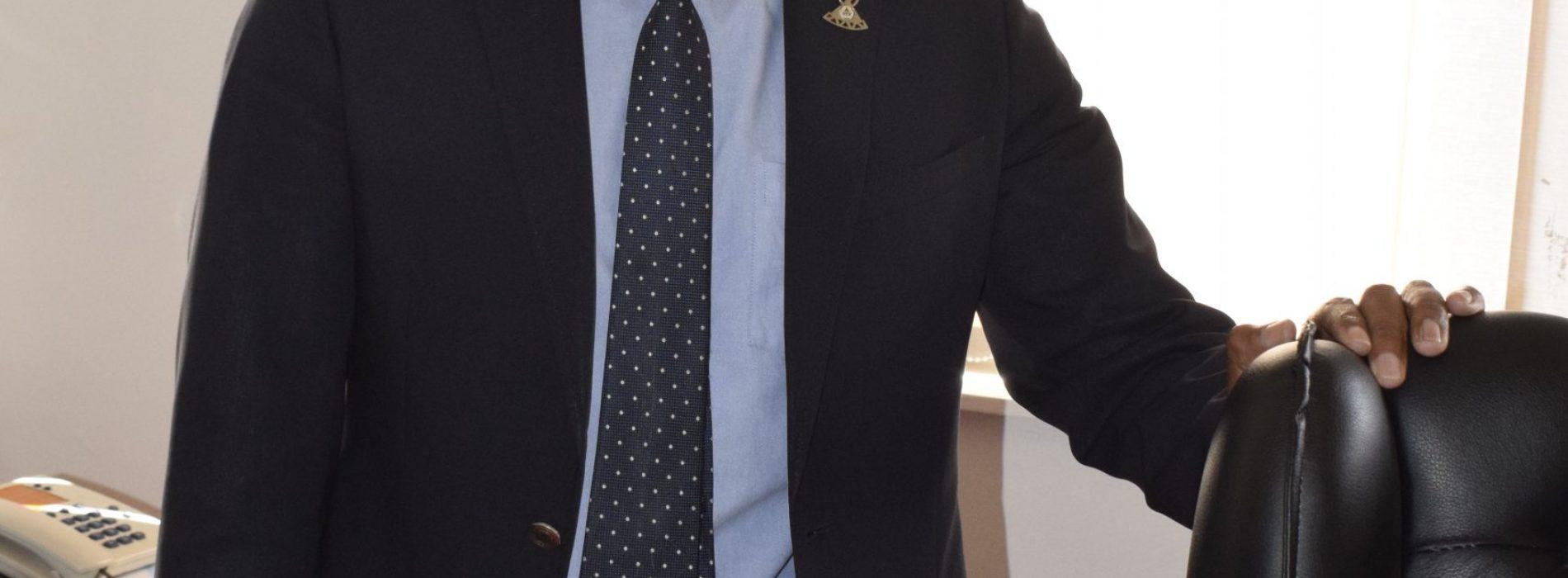Africa-Press – Lesotho. BEING a cabinet minister is far from Moshe Leoma’s childhood dreams. Growing up a taekwondo player and trainer at Lesotho Higlands Project Contractors (LHPC) facility, Leoma’s ambition was to be a soldier.
“All I wanted was to be a soldier,” said Leoma who is now the Minister of Labour and Employment, citing his involvement in taekwondo as an influence back then.
“Being a taekwondo player increased my chances of being accepted.
”
He said he also envied two men from his village who were soldiers.
“The environment I grew up in had an impact on me,” he said.
After completing his Form C in 1992, Leoma stayed at home for two years intending to fulfil his dream, only to learn in 1994 that entrance requirements had been set at a minimum of a Form E certificate.
“I had to return to school if I was to fulfil my dreams.
Unfortunately, my parents were no longer able to pay for my fees hence I resorted to selling vegetables to complete my studies at St Paul High School,” said the 49-year old.
Leoma said he grew up like any other Mosotho child: herding animals, going to cattle-posts, planting the fields and, like any responsible parent, his late father tried to push for their education until he died in 1991.
“That’s when poverty struck my family,” he said, noting that he had to take over the role of breadwinner. He said his brother helped to pay for his first quarter in Form D before losing his job.
“I did all I could to pay for my fees; bought potatoes and apples in bulk for resale in town and I hired some boys to sell them for me while I was at school.
I even told my headmaster that at times I will not show up at school to stock up from South Africa. ”
His ambition to be a soldier remained so he continued to apply for the job.
“I applied and failed seven times.
At the time, I still had a chance to further my studies but I didn’t because all I wanted was to be a soldier; at some point I even reduced my age,” he said, adding that his passion contributed to his failure to proceed to tertiary level.
He described the period as his most challenging time, but he soldiered on to get a certificate. “I managed to pass but clearly being a soldier wasn’t for me,” he said, adding that his friends encouraged him to consider alternative career prospects. He recalled the day he came up with the idea of selling trees. He said he was sitting in a hut with the door open.
“I was looking at a tree outside and I thought ‘what can that tree do for me? Molimo o nyenyeletsa motho (God whispers in one’s ear) because right there I remembered that there were trees sold from July-August and such trees were available at the Butha-Buthe nursery.
I immediately rushed to inform my friend and we had an agreement but decided to buy them at Clarence. “Each tree was M1 and we managed to get M4 000 which we used to buy a 4+1 taxi.
It birthed three more for me and two for my friend. ”
He said he worked hard to open a route from Belo to the Butha-Buthe border post. “I managed to open that route and the police even arrested me based on allegations that I had a gun.
But the issue was resolved. ”
Following the incident, he said he was selected to be part of the Lesotho Taxi Association representing 4+1 owners. “That is where I learnt leadership as I attended workshops both within the association and taekwondo.
I learnt to solve disputes through talking, not fighting,” said Leoma. He said his 4+1 business grew and he also became a Butha-Buthe 4+1 route committee member within the Cultural Taxi Association.
He said he heard a gunshot on his way home one day, leading to events that made him take a more active role in community issues. “It was a fight between Ha-Chepeseli Chief, Ha-Mapate and Ha-Motšoane (all found within Matlakeng constituency.
) I intervened by bringing youths from all the areas together. It was easier to bring them together to solve the issue as I was known in the area because of my involvement with taekwondo.
“We collaborated until we formed and registered Tšoana-Maliba Cultural Village Cooperative Society Ltd; we wore cultural clothing and it grew quickly that it represented the district on different cultural events, including during His Majesty’s birthday.
”
He said he is still seeking funding from investors to build a cultural village there.
“I completely resolved the fight and following that I was elected a councillor in 2011.
I didn’t know what being a councillor entailed and I hated politics but villagers even sang the whole night at my home asking me to run to be the local councillor,” he said, adding that he eventually agreed to be an independent candidate.
“I filled the nomination form but I didn’t even campaign that much. But I was chosen by over 350 people, followed by one who belonged to a party with 200 votes,” he recalled.
He said he was soon to be approached by both the LCD and ABC parties who wanted to lure him into their respective ranks. “I agreed to join the ABC as I loved it and I won the constituency in the 2015 and 2017 elections.
” In 2019 he was appointed deputy minister of public works as well as that of local government after the 4×4 coalition failed.
Leoma said being a politician and a black belt holder in taekwondo changed his mind set a lot. “I often resorted to fighting but I learnt it wasn’t the wisest move.
I am now using Taekwondo as a form of exercise,” said the man who once hated politics. “I hated politics with all my heart. My father and brother were LCD members but I hated that.
I saw it as something that hurt people and in Taekwondo as we were trained by soldiers, they encouraged us to stay away from it. ” He said joining politics affected him mentally.
“Luckily, my followers supported me and helped me in the right direction until it changed my mind and life generally — it made me soft and often people get surprised.
It channelled me in the narrow path,” he said. Leoma added “some people even said it made me a skepsel (poor one)”. He said being appointed Labour Minister presented new challenges.
“After receiving my promotion letter, I was afraid to read it. I read it shaking when I saw Labour and Employment. I almost declined the offer but my wife encouraged me to take it,” he said.
He said he still questioned the Prime Minister “why he was doing that to me” and his response was simple: “I want to see something in you. Go and work there for at least three months and if it’s burdensome I will remove you.
”
He said fellow ministers showed compassion.
“The day of swearing in, I wasn’t myself at all,” he said, remembering what they learn in orientation; working with civil servants.
He said one of the biggest challenges was that he was joining the ministry at the time of the gazetting of the minimum wage, which had not been announced by the previous minister because of Covid-19.
“People called me just to insult me and even involved my family, threatening to beat up my parents.
My wife even encouraged me to give up but I didn’t. ”
He said another challenge was that of foreigners working in the country without documents. “It is a big issue and worse, they are given a chance by Basotho.
”
He also said it is his ministry’s job to protect the jobs of Basotho and intervene during strikes.
“It becomes a problem when employers play hide and seek with us and avoid us. This challenge leads to sleepless nights,” he said.
He said another challenge was lack of resources at the Directorate of dispute Prevention and Resolution (DDPR), a situation that hindered progress. “People approach me directly and blame me for lack of service delivery,” he lamented.
He also said the Labour Court lacked staff and their offices were small as well. “We have huge problems. ” He said Basotho were hired as labour but managed by foreigners as they sometimes failed to deliver quality services.
“Some owners even ask us to allow deployment of foreigners in managerial positions but looking at how many Basotho they have hire…it becomes a challenge,” he said. He said there is a need for a bargaining council to end the frequent strikes by factory workers.
“They should be able to discuss their issues without the ministry’s engagement and this is provided for in the 1992 Labour Code review, although it is still in parliament counsel.
It will help us solve such issues if passed. There are a lot of issues but we have a Bill ready to address such issues. ”
He said currently employees meet under a wages advisory board led by the ministry.
“This kills us as the ministry ends up unnecessarily intervening in disagreements.
The passing of the Bill will solve so many weaknesses in the labour code. Employers and employees need to be able to solve their issues amicably. ” He blamed partisan politics for “destroying the country.
”
“I realised this when dealing with the factory workers strike. It is everywhere, even in parliament, a good thing can be rejected without valid reasons.
If only certain positions like those of Principal Secretaries can be made permanent, it will help a minister to work on available long term strategy. ”
He said the main challenge was lack of implementation.
“We do have laws but we have to tighten our efforts towards implementation.
” Leoma said the ministry has realised that some Basotho “relax” instead of learning from the foreigners with a view of taking over the jobs.
“When a permit is up for renewal we sometimes end up extending it even for months. Basotho then start to complain yet they don’t put efforts to obtain the position,” he lamented.
He said they learnt that in other instances, certain jobs were given ka thutsoana ea ’mooane (on a silver platter) because of negligence. He said the operation to expose undocumented foreigners was his strategy “to completely end the practice”.
“I don’t want to stop but continue until I leave the ministry,” said Leoma, who counts former Prime Minister Thomas Thabane among his role model.
Leoma said he has no plans to cross to any other party. “If it comes to that, then I will leave politics. I was planning to leave this term to focus on the cultural village and farming but my supporters refused.
If I win a third term then I will allow them to choose whoever they want after me. I can never cross to another party,” he said, adding: “Lies in politics is another reason why I want to retire.”
For More News And Analysis About Lesotho Follow Africa-Press






